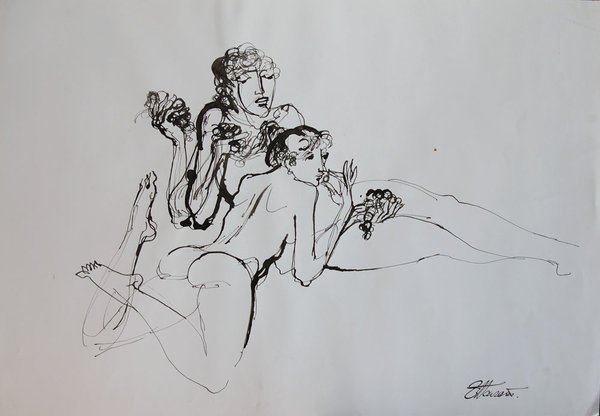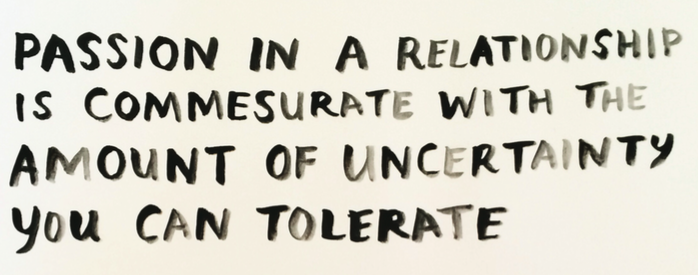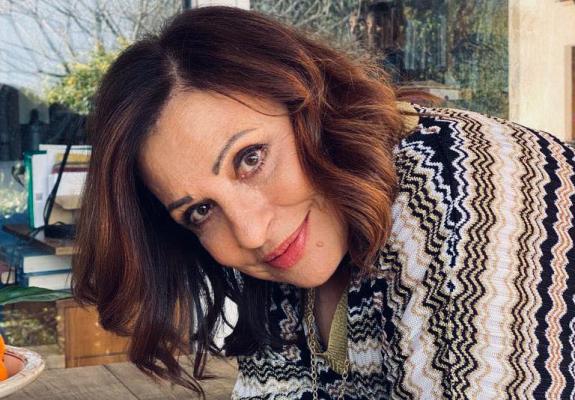Mating in captivity
Why is it so that loving relationships find it difficult to continue to experience desire?
According to psychotherapist Esther Perel, a licensed marriage and family therapist and author of the book Mating in Captivity: Reconciling the Erotic and the Domestic, greater intimacy doesn’t lead to better sex, but quite the contrary.
She brought attention to the fact that in modern times, in which the nuclear family structure is characterized by an increasing isolation and individualism, there is an increasing need to compensate for this alienation by developing greater intimacy between the two people. The realities of the modern world are such that a couple will have to face everything, privately and as a team, them against the world. At the same, we have expectations that this special-one relationship (traditionally referring to a life-long monogamic relationship), should be able to provide and cover all our needs, indeed, we expect a relationship for everything: a partner who is the best friend, the companion, the caregiver and the passionate lover all at once.
There is no growth without change and for better or worse, to grow we usually have to step out of our comfort zone
She suggests that as in nature there is a constant push and pull between change and stability, the same principle is true for couples, and that the difficulty lies in our inability to reconcile, on one hand, our need for security, familiarity and predictability, and on the other, our need for adventure, novelty and risk.
In this sense an erotic affair may make a person feel alive again the way only desire, passion and lust can. No person sets out with an inherent intention to hurt the long-term partner, but may do so in search of a sense of freedom and change in a relationship that has become too stale or rigid.

Long-term relationships go through ups and downs, but many fail to recover back in a good phase. When desire fades and domesticity takes over, a feeling of flatness or dullness may set in, even a feeling of ‘deadness’, but it still doesn’t mean that it is not a loving or a happy relationship, just not necessarily everything. With infidelity today, being more of a taboo than divorce or brake up and with the mantra “I chose the wrong person”, we prefer to opt out of a long-term relationship in search of another who might be able to do that, before we question the model of the institution itself. What sustains desire and is it something that we can cultivate? According to Mrs. Perel, we can.
So why is it that loving relationships find it so difficult to continue to experience desire?
During her practice, with couples of all sorts of sexual orientation throughout a period of 30 years, she tried to understand the main ingredients of the erotic and her qualitative data have indicated the following: Imagination, playfulness, novelty, curiosity and mystery, with imagination being the most important agent.
As she explains, “You can have sex, you can have your average number every week, but that’s not lust, and that’s not erotic, and in the same way, a simple discussion over coffee can be very erotic without any physical contact.”
According to Mrs. Perel’ s hypothesis, it is intimacy that gets in the way of passion. She arrived to this conclusion by examining the different ways we love.

On one hand, there is the intimacy due to domesticity; love that develops out of the realities everyday day co-living, which are built on habit, dependency, responsibility, commitment, and as she describes it: “I’ve milked your cows, I’ve fed your kids, I’ve slept with you, and if that ain’t love, what is?”
She argues that our caregiving love has an element of selflessness which makes us worry, care, want to protect, but, paradoxically, those are the same forces that deflate erotic desire. According to her words “ the erotic goes more selfish, much more raw, much more objectifying sometimes, much less into that caring, protective element, and there is no neediness in desire. There is no caretaking in desire.” Desire needs freedom, adventure, novelty, mystery, risk, danger, for the unknown, for the unexpected, surprise and list goes on.
The difficulty lies in reconciling these two conflicting needs, to experience them at the same time in balance: our sense of autonomy and freedom in the middle of connection.
To deal with the anxiety, fear and insecurity of the ever-present prospect of the loss of love and to minimize the possibility of rejection, we invent rules, in order to establish a sense of control and ‘ownership’ over the other person, to feel safe. Thus, in name of connection and security we stifle each other.

“The crisis of desire, then, is a crisis of the imagination, and, if we take eroticism as intelligence, then, it's something that can be cultivated.” Do we dare ask difficult questions about what the other person would like to explore erotically, even if only in fantasy? For many couples a discussion of one’s erotic tastes and interests may never come up.
With time comes domesticity, and we come to think of our partner as an extension of ourselves, nothing new to explore, but is it so? When it comes to sexual desire, a taboo topic, we usually hover around non-verbalized boundaries of what can or cannot be expressed, without questioning.
Indeed, it is much more difficult to show secret sides of ourselves to a long-time partner because the risk is too great; there is so much at stake, physically and emotionally: loss, disapproval, judgment, hurt and the list goes on. Not only that, but it is also far easier to be complacent in a safety zone than transgress the boundaries of our implied or agreed rules, even in thought, but unfortunately, when we expect so much from the other person, it becomes much harder to experience playfulness, curiosity, novelty, imagination, which are the key ingredients of the erotic.
 **To be intrigued once more by our partner,** to desire to ‘cross the distance’ to get to know them, there needs to be a distance to be crossed. To see a long-term partner with new eyes means to not only shift our perception to see them as polyprismatic, which we all are, but also accept them as entitled to their own autonomy, not only in physical terms but abstract as well, entitled to their diversity; nobody said that dealing with the uncertainty of another person’s autonomy, isn’t a great challenge.
**To be intrigued once more by our partner,** to desire to ‘cross the distance’ to get to know them, there needs to be a distance to be crossed. To see a long-term partner with new eyes means to not only shift our perception to see them as polyprismatic, which we all are, but also accept them as entitled to their own autonomy, not only in physical terms but abstract as well, entitled to their diversity; nobody said that dealing with the uncertainty of another person’s autonomy, isn’t a great challenge.
Sex is not just a behavior, it is a language, intelligence, a dialectical process or simply put, a place we go in our imagination on our own or with others
“Where do you go in sex? What parts of you do you connect to? What do you seek to express there? Is it a place for transcendence and spiritual union? Is it a place for naughtiness and is it a place to be safely aggressive? Is it a place where you can finally surrender and not have to take responsibility for everything? Is it a place where you can express your infantile wishes? What comes out there?”
Why? Because we should strive to practice a conscious choosing of the boundaries in our intimate relationship, while allowing at the same time, the space to explore eroticism in a context without malice, criticism, or disdain. It can be painful but it can also be incredibly healing. There is no growth without change and for better or worse, to grow we usually have to step out of our comfort zone.

Artist of drawings: George Palatnikov










